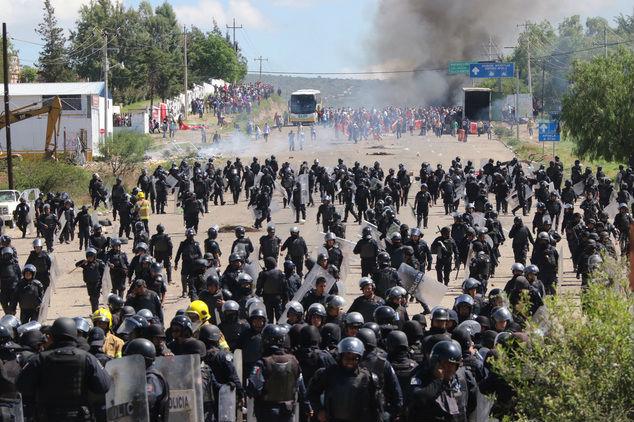Fuel, food and medicines run out in southern Mexico as striking teachers block highways
Oaxaca City, one of the jewels on the Mexican tourist route, has a long history of teacher unrest

Parts of southern Mexico are running out of critical supplies, including food, medicines and petrol, the latest development in the increasingly bitter and sometimes violent confrontation between the Mexican government and teachers in the state of Oaxaca.
The shortages appeared to be especially acute in neighbouring Chiapas, however, where roughly 90 per cent of all filling stations were expected to be without fuel by Wednesday, according to statements from government officials and local businesses.
As part of their strategy to overturn the reforms introduced by the government of President Enrique Peña Nieto, striking teachers have brought distribution of goods by road in large areas of southern Mexico to a standstill by erecting road blocks. While private cars are generally let through, all commercial vehicles and lorries are forced to turn around.
The long-simmering dispute is centred in and around the city of Oaxaca, a popular tourist spot. Peace was shattered ten days ago, when clashes between security forces and the teachers exploded into chaotic violence in the nearby town of Nochixtlan. By the time it was over, nine people, including one local journalist, had been killed and one hundred others were injured.
In one of the poorest regions of the country, Oaxaca relies on tourism, including from overseas, to boost its fortunes. But the city has an infamous tradition of teacher activism. In 2006, the picturesque city found itself in virtual lock-down for six months as a series of street protests demanding better pay similarly spun out into violence, leading to dozens of deaths.
Last week, the US embassy in Mexico City issued a warning to all US goverment employees to avoid travel to the city of Oaxaca, known for its colonial buildings and rich cuisine. Government officials headed to resorts where the state meets the Pacific Ocean, including Huatulco, were told to fly directly only and not pass through other parts of the state.
It is estimated, meanwhile, that many private businesses in the region are now losing about 80 per cent of their sales because of the blockades. The National Human Rights Commission in Mexico City issued an urgent appeal for them to be lifted before the crisis deepens.
“The legitimate right to peaceful protest cannot override the rights of others to free movement, nor can the daily life and survival of Oaxaca be held hostage to political demands,“ the commission wrote in a statement.
The protests are meanwhile wreaking huge damage on tourism, which should be picking up as Americans and Europeans take summer breaks and the city gets ready for next month's annual Guelaguetza folklore festival, which usually draws hundreds of thousands of tourists.
The Interior Ministry reported that only about 5 per cent of hotel rooms in the city of Oaxaca were occupied as of Wednesday, a disastrous figure.
President Peña Nieto’s reforms are an attempt to raise the sometimes dismal standards of education, especially in rural Mexico. It means that teachers, who are represented by the still powerful National Coordinator of Education Workers (CNTE) union, will for the first time have to submit to regular testing. Any teacher who fails to reach pre-set standards three times in a row will automatically be fired, which ends for ever the assumption that teachers’ jobs were for life.
The Oaxaca chapter of the union, known as Sección 22, has been especially visceral in resisting change, reprising some of the strike action that convulsed the city ten years ago. The rioting of 19 June erupted after the authorities arrested two of the chapter’s leaders on money-laundering charges. Among those injured in the conflagration were 55 police officers.
Bordering Guatemala, Chiapas has recently also come to the notice of foreign tourists in spite of its relative remoteness. As well as dramatic topography and deep jungle habitats, the state also boasts some of the finest Mayan ruins in the country. Meanwhile its main city in its central highlands, San Cristóbal de las Casas, offers some of the same colonial treasures as Oaxaca.
The striking teachers in Oaxaca have been drawing support from leftist sympathisers from across the region. This week the National Assembly in Ecuador overwhelmingly passed a resolution voicing support for the teachers and deploring what they said was state repression by the Mexican government.
Maria Augusta Calle, head of the assembly's international relations committee, said it was “important that the assembly make a statement against events that cause revulsion around the world.”
Join our commenting forum
Join thought-provoking conversations, follow other Independent readers and see their replies
Comments